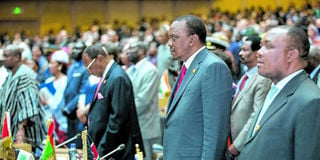What is AU doing to liberate the former French colonies?

African leaders follow proceedings during the opening ceremony of the 26th African Union Heads of State and Government Summit in Addis Ababa, Ethiopia. The AU should not allow the French government to take control of the financial management of the countries it colonised. PHOTO | AFP
What you need to know:
- Essentially, these countries may have achieved political independence but are still financially dependent on their former coloniser.
- Koutonin says that any African leader that has resisted this form of neocolonialism, or who has threatened to disobey the pact, finds himself either ousted in a coup or killed.
Many historians have tended to look at French colonialism in Africa more favourably than British or Belgian colonialism in places such as Kenya and the Democratic Republic of the Congo.
In the former, the British settlers engaged in massive land grabs and dealt brutally with those demanding freedom from British rule.
In the DRC, the Belgians were more interested in looting the country’s vast natural resources and minerals than in building infrastructure or institutions.
They say that the French were not so interested in oppressing and exploiting the Africans as they were in assimilating them into French culture.
This may be true, but what is not widely known or acknowledged is that as many as 14 Francophone African countries, including Mali, Senegal, Ivory Coast, Burkina Faso and the Central African Republic, are is still joined at the hip to their former colonial master through a colonial pact that obliges them to deposit up to 50 per cent of their foreign reserves into France’s central bank.
Apparently, the money is held “in trust” by the French government to guarantee the CFA franc that is used in these former French colonies.
According to the Bank of France’s 2012 annual report, the amount of cash it holds from African countries is larger than the GDPs of all except two of the 14 countries.
What’s more, the African countries can only access 15 per cent of this money in any given year; if they need more, they have to “borrow” it at commercial rates.
Essentially, these countries may have achieved political independence but are still financially dependent on their former coloniser.
This shocking revelation came to me via an article by Mawuna Remarque Koutonin, published in siliconafrica.com last month.
According to Koutonin, this pact was based on the ridiculous premise that African countries owed France a “debt” for building infrastructure in these countries during the colonial period.
MODERN SLAVERY
The pact further ensures that France or French companies receive priority when it comes to buying or investing in the natural resources of these countries.
France also has the exclusive right to supply these countries with military equipment and to militarily intervene in them — this explains why French troops are always the first on the ground when a Francophone African country experiences conflict.
Koutonin says that any African leader that has resisted this form of neocolonialism, or who has threatened to disobey the pact, finds himself either ousted in a coup or killed.
For example, when Togo’s first president Sylvanus Olympio decided to issue Togo’s own currency and to discontinue the CFA franc, he was assassinated by a former French army sergeant supposedly on the orders of the French Government.
When Mali’s first president Modiba Keita attempted to do the same, he was overthrown in a coup.
With all the chest-thumping at the African Union about African nations being sovereign, and why they must exit en masse from the “colonial” International Criminal Court, I wonder why African heads of state have not demanded that France “liberate” these 14 African countries from what essentially amounts to economic slavery.
How can the AU allow 14 of its members to not have a say in their own financial management? How can it allow France to determine these countries’ economies?
The government of France argues that the holding of African cash in France’s treasury is a “necessary evil” to stabilise the CFA franc.
However, as Koutonin laments, the pact itself is evil because it forces African countries to puts billions of their own dollars into the French treasury every year.
WIDENING GAP
Talking of economic injustices, a report released by Oxfam International says that the gap between the rich and poor has reached new extremes.
In 2015, just 62 individuals owned half of the world’s wealth.
What’s more, the wealth of these 62 has risen by more than 45 per cent since 2010, while the poorest half of the world’s population has received just 1 per cent of the total increase in global wealth since 2000.
This state of affairs, says Oxfam, has been driven by “market fundamentalism” and a global web of tax havens that have benefited the rich at the expense of the poor. The report calls for an end to “the era of tax havens”.





